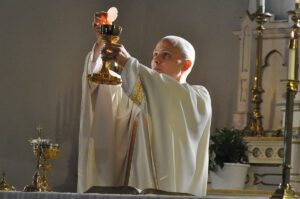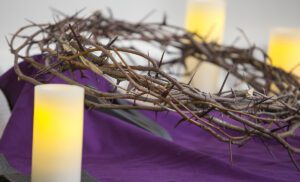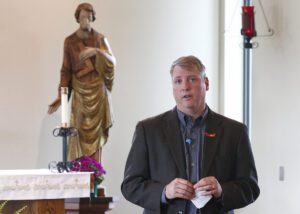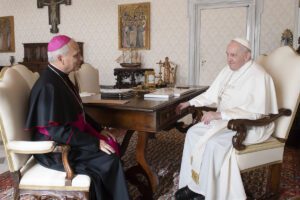(OSV News) – A priest who offered up his suffering from cancer for the sake of clerical abuse victims said he has experienced a miraculous healing following a June 2022 pilgrimage to the Marian shrine at Lourdes, France.
Father John Hollowell, a priest of the Archdiocese of Indianapolis, told OSV News that doctors have said his brain tumor, diagnosed in 2019, has disappeared.
“I had an MRI two weeks after I got back from Lourdes (at the end of June 2022),” said Father Hollowell, who first announced the news in a Jan. 30 video message on his YouTube channel. “All that remained was scar tissue from the surgeries.”
In 2020, Father Hollowell learned that a series of fainting spells and dizziness were the result of an oligodendroglioma – a brain tumor usually occurring in white and non-Hispanic males between the ages of 35 and 44. About 1,200 individuals in the U.S. are diagnosed with the tumor each year.

But the rare form of cancer was not entirely a surprise to the priest.
“In 2018, I made a prayer that I would be willing to suffer for the victims of the Catholic clergy’s sexual abuse,” he told OSV News. “And then a month later, I had what I know now was the first seizure from the brain tumor.”
The diagnosis was not confirmed until Feb. 11, 2020, the feast of Our Lady of Lourdes, by doctors at the Mayo Clinic in Minnesota.
“I knew it was the answer to the prayer I had made two years earlier,” said Father Hollowell, noting he celebrated Mass that same day in the “stunningly beautiful” chapel at the clinic’s St. Mary’s Campus.
Before surgery at Mayo, the priest took to his now-closed Twitter account, letting his 20,000 followers know in a Feb. 13, 2020 post that he planned to “embrace this (illness) willingly” for clerical abuse survivors.
The offering gained national attention, prompting hundreds of tweets and emails of gratitude from around the world.
About a month later, Father Hollowell returned to Mayo for surgery, taking with him “the names of about 180 victims” who had contacted him.
“I literally prayed for them every day,” he told OSV News. “I had a wristband on my arm that said ‘For the victims.'”
The procedure revealed that “some fingers from the tumor had gone deeper into my brain than the neurosurgeon expected,” he said.
The surgery also coincided with the onset of the COVID-19 pandemic in the U.S., and Father Hollowell remained at Mayo, having developed infections from the surgery, which was followed by two more operations as well as radiation and nine months of chemotherapy.
The Archdiocese of Indianapolis granted Father Hollowell a medical leave of absence from his assignments, which include pastoring two Indiana parishes — Annunciation Catholic Church in Brazil and St. Paul the Apostle in Greencastle — and serving as a Catholic chaplain at DePauw University in Greencastle and at Putnamville (Indiana) Correctional Facility.
Father Hollowell said his chemotherapy, which was marked by “a lot of complicating factors,” prompted side effects that included depression and even suicidal thoughts.
He completed that treatment and returned to his parishes by July 2021, reporting for MRI scans every three months. By January 2022, scans showed the tumor was starting to regrow, joined by a second tumor on his pituitary gland.
“I was totally fine with dying,” Father Hollowell told OSV News. “It’s actually a prayer I had started to make: ‘If I am able to offer up my life in reparation for the crimes of priests, I would do that willingly.'”
At the same time, he booked a June 2022 trip to Lourdes — site of 18 Marian apparitions experienced by St. Bernadette Soubirous in 1858 — to see if he might be one of the thousands who claim to receive healing from visiting the shrine.
He also had another objective.
“I thought … if I’m healed, that might help draw some of my family members and friends who had fallen away (from the practice of faith) back to church,” Father Hollowell told OSV News.
The trip, which he undertook alone, proved to be “a nonstop adventure,” he said, one that saw him getting lost while walking from a train station to the shrine, and almost missing his spot in line to splash himself with the sanctuary’s famed spring waters.
At times, he found himself “at the point of tears,” he said.
Yet Father Hollowell said “the greater experience” was seeing “thousands of my prayers, not related to my health,” answered.
Two weeks after his return — with parishioners already telling him he “looked a lot healthier” — an MRI showed Father Hollowell’s oligodendroglioma was gone. Issues from the growth on his pituitary gland “stopped when I got back from Lourdes,” he said.
Now, doctors have told Father Hollowell to report for MRIs every seven, rather than three, months.
But he’s not planning to submit his case to Lourdes’ medical officers for consideration.
“As a parish priest, I feel like I don’t even have the time to go through all of that, (getting) a miracle approved,” he told OSV News. “I don’t really need doctors to tell me I have a miracle, even though I do.”
And if his cancer returns, he is prepared.
“If it comes back, that’s God’s will, and I’m totally at peace with whatever that is,” said Father Hollowell. “I’m not afraid, and that can only come from the Holy Spirit. Jesus says to just worry about one day at a time.”



